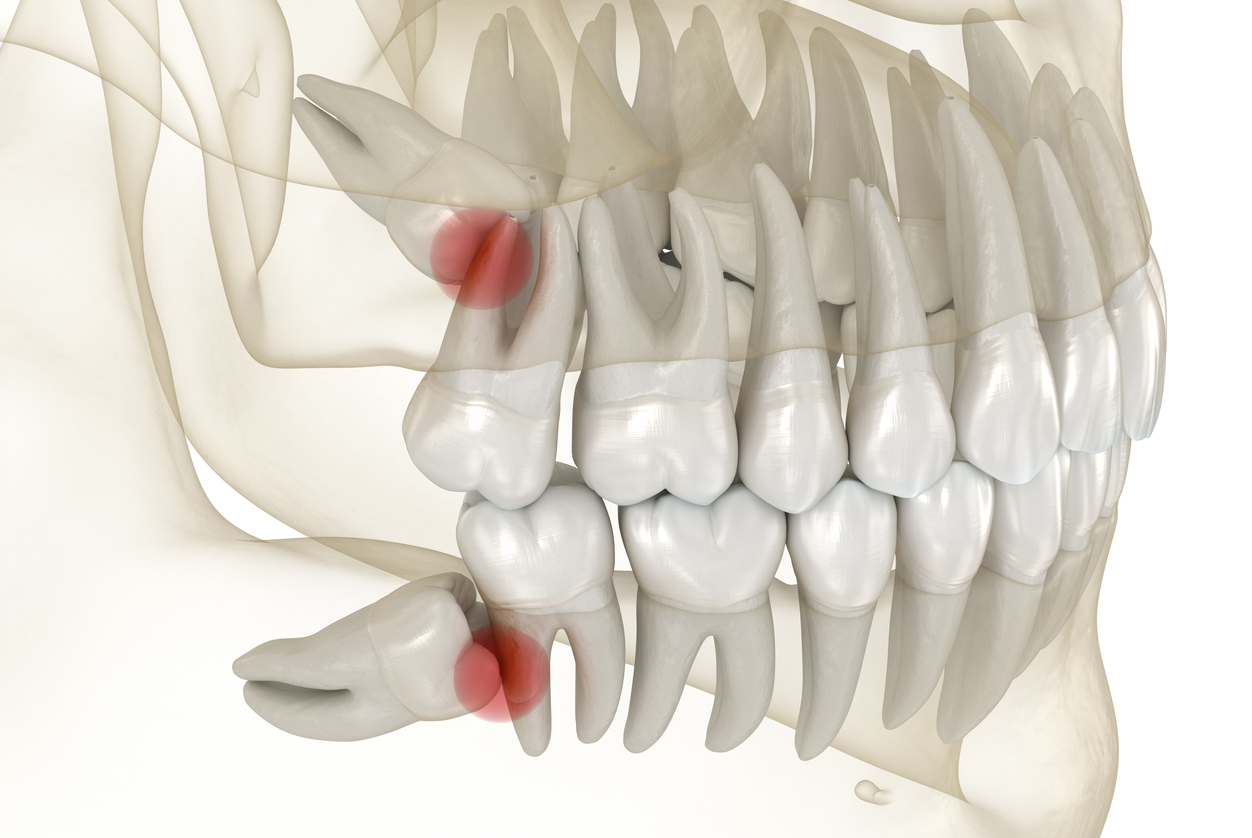Typically, wisdom teeth appear between the ages of 15 and 25. Wisdom tooth extraction is a common procedure, with ten million wisdom teeth removed each year, according to the statistics. But why do wisdom teeth need to be removed? Please read our article to learn about the signs you need an extraction and the procedure.
Why Do Wisdom Teeth Need To Be Removed?
Wisdom teeth do not always need to be extracted. Some people have healthy and fully erupted wisdom teeth that do not cause any issues. However, several reasons might call for wisdom teeth removal:
- Wisdom teeth that stay hidden under the surface of the gum can cause pain and infections. This condition is called impacted wisdom teeth and almost always leads to extraction.
- In some cases, only a part of a wisdom tooth erupts to the surface—this is called a partially impacted wisdom tooth. Such wisdom teeth are also often painful and easily infected because they can not be properly cleaned regularly.
- Sometimes, even if wisdom teeth are fully erupted, they are positioned in such a way that keeping them clean is challenging. Plaque and tartar accumulate on such teeth, and they get cavities or decay. Cavities in wisdom teeth can be treated with dental fillings, but if they reoccur often, such wisdom teeth put the health of other teeth and the gums in danger. The best solution for this issue is wisdom teeth removal.
- Wisdom teeth are removed if they cause overcrowdedness or other orthodontic issues by pushing other teeth due to the lack of space. It is best to remove such wisdom teeth before they make the issue worse.
- Wisdom teeth can be removed in preparation for orthodontic treatments to create more space in the mouth for other teeth to move.
Consult your dentist to establish if your wisdom teeth are likely to cause issues and have to be removed.
Signs That Your Wisdom Teeth Are Infected
Symptoms that indicate wisdom teeth infection include:
- Red, tender, painful, bleeding, or swollen gums around wisdom teeth
- Sensitivity of your wisdom teeth to changes in temperature (when drinking hot or cold beverages, etc.)
- Toothache or sensitivity or pain when a wisdom tooth is touched by the tongue or a finger
- Persistent bad taste in the mouth
- Bag breath even after thoroughly brushing and flossing your teeth
- Pain or swelling of the face in the jaw area
- Stiffness in the jaw or difficulty opening the mouth
If you have any of the symptoms above, make an appointment with your dentist as soon as possible. However, in some cases, impacted or infected wisdom teeth might not have any symptoms, so it is always a good idea to get regular dental checkups to spot the issue before it damages the surrounding teeth and the gums. Dentists recommend having checkups and professional dental cleanings every 6 to 12 months.
The Procedure of Wisdom Teeth Extraction
Wisdom teeth extraction is a surgical procedure. It is typically performed using local anesthetic, so in most cases, patients do not feel any pain or discomfort during the surgery. Depending on the position of your wisdom teeth and the difficulty of the surgery, your dentist might recommend having general anesthesia.
During the procedure of removing a fully erupted wisdom tooth, your dentist will separate the tooth from the gum and then pull it out. If the case is simple, the procedure can take as little as several minutes. If a wisdom tooth is hidden beneath the gum, your dentist will start by making an incision in the gum and then removing the tooth. In most complex cases, the surgery might take up to one hour.
The recovery typically takes 7 to 10 days. During this period, you might experience swelling in the face and some pain or throbbing at the surgery site. However, this type of pain can be managed with over-the-counter painkillers, such as Ibuprofen. You will have to adhere to a liquid and soft diet for several days after the extraction. Your dentist might also prescribe a course of antibiotics to avoid infections.
Make an Appointment Today
To have the health of your wisdom teeth checked or to get your wisdom teeth removed, make an appointment with a dentist in Upland today. Our specialists will conduct all the necessary examinations, including a physical exam and an X-ray or scan, to determine whether your wisdom teeth need to be extracted. In our dental office, we provide a stress-free wisdom teeth extraction procedure.
We look forward to your visit to My Dentist Upland.

